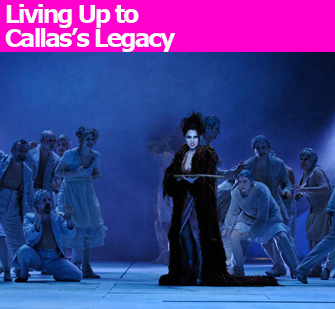 |
|
Norma (Lina Tetriani) is the head druidess of the Gauls, who resemble inmates of a mental institution in this production. Photo: Marie-Noelle Robert |
Every new production of Bellini’s Norma, especially in Paris, needs to deal with the extraordinary legacy of the soprano who is indelibly associated with the title role: Maria Callas. Not only is her …
 |
|
Norma (Lina Tetriani) is the head druidess of the Gauls, who resemble inmates of a mental institution in this production. Photo: Marie-Noelle Robert |
Every new production of Bellini’s Norma, especially in Paris, needs to deal with the extraordinary legacy of the soprano who is indelibly associated with the title role: Maria Callas. Not only is her recorded rendition of “Casta Diva” still one of the most frequently played pieces on classical radio stations (indeed, does one ever hear the aria sung by anyone else?), but her performances in Paris in 1964 and ’65 in Franco Zeffirelli’s famously sumptuous (but essentially conservative) production of Norma are still the stuff of legend. Sadly, the Zeffirelli version was the final new production in which she sang, and she spent her last years in Paris as a virtual recluse.
It is no surprise then that for this first major Paris production of the opera in 10 years, both music director Jean-Christophe Spinosi and stage director Peter Mussbach have sought to distance themselves from productions of the past and to put their own mark on the work. Spinosi studied performance practices from the time of Bellini and looked at the composer’s own score. As a result, three sections that appeared in the original version and were subsequently cut have been restored in this production, including the much-merited repeat of the gorgeous cello solo that opens Act II.
Mussbach opts for an avant-garde approach. By keeping almost all the characters (including the chorus) on stage throughout the opera, he seems to be underlining the sense of claustrophobia and oppression that the embattled Gauls (of whom Norma is the chief druidess) feel under the Roman occupation. Although the decision to make the chorus of Gauls resemble inmates of a mental institution (each member staggering about the stage absorbed in his or her own world) leads to an unnecessarily messy and busy stage in Act I, the second act is visually stunning, culminating in a glorious conflagration.
Did the Parisian public appreciate these attempts to look afresh at this staple of the Italian operatic repertoire? Not a bit. At the curtain call, the loudest boos of the night were reserved for Spinosi and especially Mussbach and his team, thus confirming my suspicion that aficionados of Italian opera are essentially a conservative bunch. If they thought that this updated version was beyond the pale, they clearly did not go to the pointlessly modernistic productions of German and Czech opera that were staged under Gérard Mortier’s reign as general director of the Opéra National de Paris, now mercifully at an end. This production at least was intelligent and had some logic to it.
The singers fared a little better under the harsh gaze of the audience. Although the Georgian-American soprano Lina Tetriani (original surname Tetruashvili), singing the part of Norma, undeservedly received a tepid response, Swedish soprano Paulina Pfeiffer (playing the role of Norma’s love rival, Adalgisa) was rightly greeted with the most rapturous applause. The two duets between both singers were to me the highlight of the evening. Although Tetriani’s voice can at times seem rather lightweight, occasionally sounding strained at the top of her register, her performance of the set-piece arias (notably “Casta Diva”) was excellent, and she acted magnificently.
Nicolai Schukoff as Pollione, the Roman proconsul in Gaul who has a penchant for seducing virgin druidesses, has a resplendent physique, enhanced by the gold-sprayed body paint he wore, but lacked a suitably resplendent voice, singing somewhat unsteadily. On the opening night, the bass Nicolas Testé in the role of Norma’s father, Oroveso, was souffrant (meaning “unwell”; the French word is so much richer than the English one!), and so, even though Testé mimed the part on stage, his vocal line was very ably sung by the Polish singer Wojtek Smilek (flown in that afternoon), who stood on the side of the stage.
Even if much of the audience seemed unable to drag itself away from memories of Callas’s Norma, this new production is, if at times uneven, full of musical delights, no more so than in the glorious orchestral playing by the Ensemble Matheus at the end of the opera.
Théâtre du Châtelet: Place du Châtelet, 75001 Paris. Métro: Châtelet. Tel.: 01 40 28 28 40. Remaining performances: January 20, 22, 26 and 28 at 8pm; January 24 at 4pm. www.chatelet-theatre.com
Reader Reaction
Click here to respond to this article (your response may be published on this page and is subject to editing).
© 2009 Paris Update
Favorite